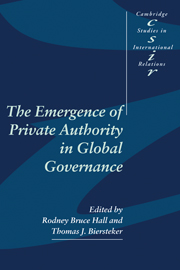Book contents
- Frontmatter
- Contents
- List of figures
- List of tables
- List of contributors
- Preface and acknowledgements
- Part I Introduction: theorizing private authority
- Part II Market authority: globalization and “globaloney”
- 3 Economic governance in an electronically networked global economy
- 4 Global finance, political authority, and the problem of legitimation
- 5 The state and globalization
- Part III Moral authority: global civil society and transnational religious movements
- Part IV Illicit authority: mafias and mercenaries
- Part V Conclusions and directions
- Bibliography
- Index
- CAMBRIDGE STUDIES IN INTERNATIONAL RELATIONS
3 - Economic governance in an electronically networked global economy
Published online by Cambridge University Press: 22 September 2009
- Frontmatter
- Contents
- List of figures
- List of tables
- List of contributors
- Preface and acknowledgements
- Part I Introduction: theorizing private authority
- Part II Market authority: globalization and “globaloney”
- 3 Economic governance in an electronically networked global economy
- 4 Global finance, political authority, and the problem of legitimation
- 5 The state and globalization
- Part III Moral authority: global civil society and transnational religious movements
- Part IV Illicit authority: mafias and mercenaries
- Part V Conclusions and directions
- Bibliography
- Index
- CAMBRIDGE STUDIES IN INTERNATIONAL RELATIONS
Summary
Geographical space as a source of explanation affects all historical realities, all spatially defined phenomena; states, societies, cultures, and economies.
In the Westphalian state system the basic unit of economic governance is the national market defined, as is the sovereign state, in terms of mutually exclusive geographic jurisdiction. Economic governance – attempts to exert authority over economies and economic actors – is exercised through borders and territorial jurisdiction.
In this chapter I argue that the emerging global world economy compromises the effectiveness of national market-based economic governance. As the minimal spatial extent of product markets grows larger than the geographic scope of the larger national markets, the latter no longer remain viable as basic units in the world economy. As an electronically networked world economy renders economic borders less meaningful, jurisdiction loses significance. As markets are increasingly constructed in cyberspace, control through control over territory becomes problematic.
In contrast, an international or crossborder world economy comprising a system of interconnected, geographically defined, national markets does not necessarily compromise territorial control. Although jurisdictional ambiguity or conflict may make economic governance more difficult, regulation and taxation through territorial national markets remain viable.
Globalization entails a systemic change in the organization of economics (and politics) comparable in scope to the transition from the feudal epoch to the modern or Westphalian system in Europe roughly four hundred years ago.
- Type
- Chapter
- Information
- The Emergence of Private Authority in Global Governance , pp. 43 - 75Publisher: Cambridge University PressPrint publication year: 2002
- 7
- Cited by

